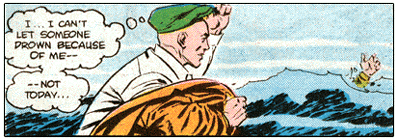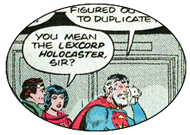
|
|
|
|

LEX LUTHOR and ELLIOT S! MAGGIN
Elliot, many of our readers feel that you write one of the best versions of Lex Luthor (along with Edmond Hamilton and Jerry Siegel, both of whom seem to influence your version). Your Lex is a fascinating villain not because he is an evil man but because he's a good man who took a tragic turn. How do you see him and his rivalry with Superman?
You've got it about right. What do I add to that? Luthor is me. On my best days. Not to say I'm some kind of super-genius, but on a really good heavy-duty writing day I can be really smart for about three or four hours. It's in those three or four hours -- totally obsessed and focused -- where I find Luthor.
 In "The Ghost of Superman
Future," you make what seems to be the first
documented reference to "LexCorp." How did that come about?
In "The Ghost of Superman
Future," you make what seems to be the first
documented reference to "LexCorp." How did that come about?
Well that's an easy one. It was what Lex would do in his future. I created it out of thin air. That was my job.
Unfortunately, when they put together Who's Who in the DC Universe, somebody somewhere decided that John Byrne had created LexCorp. He didn't. I did.
When the Lois & Clark TV show got going, John got a nice little check from Paul Levitz for "creating" this and that. One of them was the prominently featured corporate structure for Lex's enterprises. So I sent Paul a memo pointing out that the record was incorrect, citing the comic book story that you cite. Paul sent a note saying yes, that's right, thanks, and he'll correct the record. I'm not sure what it was he corrected.

portions of this interview are reproduced from an earlier conversation